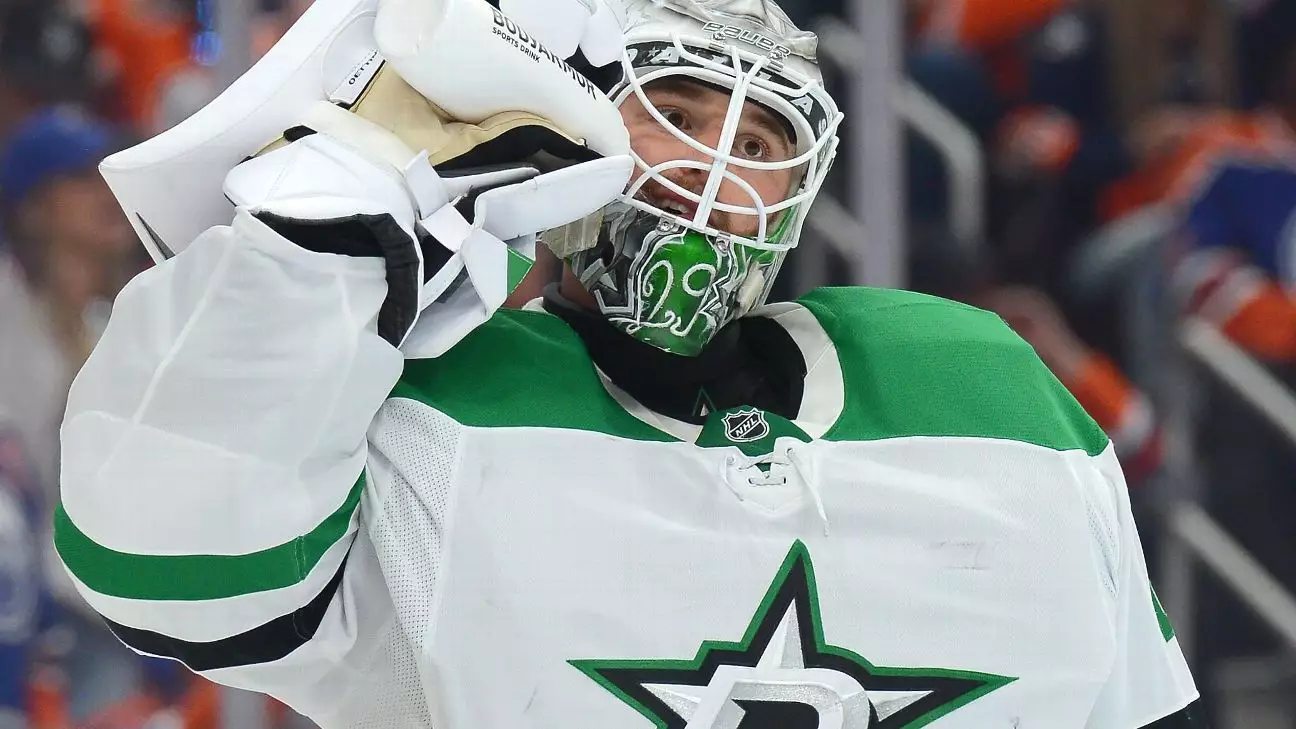In the high-stakes environment of the NHL playoffs, every moment counts, and players are often thrust into situations that demand not only skill but also mental toughness. The Dallas Stars’ goaltender, Jake Oettinger, experienced this reality firsthand when he was pulled from Game 5 of the Western Conference finals against the Edmonton Oilers. The decision, made by head coach Peter DeBoer, was riddled with controversy, especially after Oettinger allowed two goals on the only two shots he faced. This critical moment not only marked the end of the Stars’ playoff run but also sparked discussions that echoed through the franchise.
Oettinger’s feelings of surprise and embarrassment were palpable, indicative of a goaltender who has consistently exceeded expectations yet found himself ensnared in a moment of vulnerability. DeBoer, one of Oettinger’s staunchest advocates, found himself grappling with the complexities that come with coaching a star athlete who is seen as a cornerstone of the team’s future. His candid remarks highlighted his dual obligation to support his player and to make tough decisions in the heat of battle. “My job is to survive and advance,” he noted, a sentiment that rings true across the professional sports landscape.
A Tough Role to Fill
The role of a goaltender is inherently burdensome, where every mistake is magnified and every success is often overshadowed by the complexities of the game. During the playoffs, the pressure intensifies exponentially, and Oettinger, though still young at 26, has already been through the gauntlet, making his struggles stand out. This year, he faced an astonishing 503 shots across 18 games—more than any other goalie in the playoffs. With such numbers, it becomes clear why a single misstep can seem catastrophic.
In a mere 7:09 of Game 5, we saw the weight of expectations collide with the harsh reality of playoff hockey. Oettinger’s admission, “If I make one or two of those saves, then I’m still playing in the game,” is emblematic of the mindset that elite athletes must cultivate. It is a blend of accountability and resilience, framing his journey not merely as a series of unfortunate events but as valuable experiences from which he can learn and grow.
The Path Forward
After their elimination, Oettinger’s focus pivoted to self-improvement. Instead of sulking, he sought to learn from these challenging moments. His commitment to enhancing his performance speaks volumes about his character and determination. Oettinger’s journey of reflection signifies an athlete who isn’t just staring at his statistics but is dissecting the very fabric of his cognitive state during games—the mental grind of repeated pressure that can be just as strenuous as the physical demands of the sport.
DeBoer’s consideration of Oettinger’s fatigue factor raised pertinent questions about the modern player’s limits. The league’s grueling pace can easily lead to mental fatigue, which in turn impacts performance. Oettinger, however, declared himself fit, signaling a player’s desire to take on every challenge headfirst.
Franchise Dynamics and Relationships
The relationship between Oettinger and DeBoer will undoubtedly evolve in the wake of this experience. While there might be some concerns regarding the coaching dynamic after such a dramatic decision, Oettinger was quick to assuage fears. He seemed committed to learning from adversity rather than allowing it to define him. This outlook is vital not only for his own development but also for the culture within the Stars organization, which has seen its fair share of playoff heartache.
As the Stars reflect on yet another season that fell short of the ultimate goal, the narrative is not solely about loss but rather about resilience. Oettinger’s maturity in handling disappointment positions him well for future challenges; it speaks to the importance of mental fortitude in sports. As he stated, “If I go out there next year and I’m the best goalie in the world, it doesn’t matter… Just try to be the best I can be.”
Looking Ahead
The coming season offers a fresh canvas for both Oettinger and the entire Stars organization. Every setback in sports can be spawning grounds for growth, and the lessons learned this year could translate into fundamental changes for the team moving forward. There’s an intrinsic optimism embedded within the struggles; these moments have a way of forging stronger teams and more resilient players.
The Stars will now look to their future with Oettinger leading the charge as a goaltender capable of turning adversity into triumph. It’s this combination of skill, resilience, and willing to adapt that defines not just a good player, but a great one. The trajectory of a player like Oettinger is a reminder of why we celebrate sports—not just for the victories, but for the journey and the lessons that come along the way.


Leave a Reply